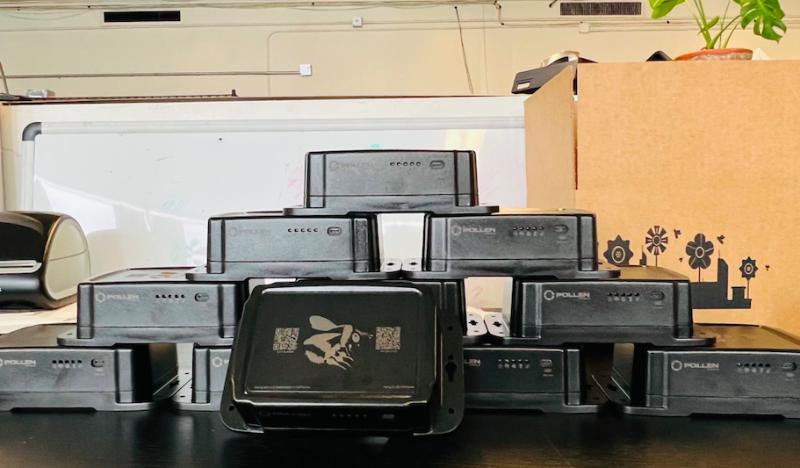Pollen Mobile is generating a buzz in several corners of the wireless industry, from equipment vendors booking orders for small cells (Pollen calls them Flowers) to real estate owners looking to place those small cells on rooftops and billboards. Pollen Mobile is similar to Helium, in that it uses cryptocurrency to compensate individuals for deploying CBRS network gear. But there are key differences.
First, Pollen already sells its own SIM cards and eSIMs for people who want to turn a CBRS-compatible smartphone into a Pollen Hummingbird, the company’s name for end user devices. (Currently, users of the Helium network need the GigSky eSIM app to connect smartphones.)
Second, Pollen is exclusively focused on LTE data, with plans to add 5G once CBRS supports it. Unlike Helium, Pollen does not support LoRaWAN. Nor does it support voice. The company told Fierce Wireless support for VoLTE would be inconsistent with its “core values” of “privacy and anonymity.”
“The world needs a private, anonymous, and decentralized global wireless communications network that is built, owned, and operated by its users,” the Pollen team explained in a recent whitepaper.
Driving development
A need to connect autonomous vehicles at mining sites drove development of Pollen Mobile. The company is a subsidiary of Pronto, which is building off-road autonomous vehicles for the mining industry, with hopes of expanding to other markets. Pronto was founded by Anthony Levandowski, a former Google software engineer accused of downloading 14,000 “highly confidential and proprietary files,” including Waymo’s LiDAR circuit board designs, before he left Google in 2016 to co-found his own autonomous driving startup, which was quickly acquired by Uber. In 2017, Levandowski left Uber; in 2018 he co-founded Pronto; and in 2020 Donald Trump pardoned him during the final hours of his presidency.
Also in 2020, the U.S. government auctioned the CBRS spectrum and certified Spectrum Access Systems to mediate sharing of this mid-band spectrum between licensed and unlicensed users. Pronto started experimenting with LTE in unlicensed CBRS spectrum at mining sites, using the Federated Wireless Spectrum Access System. Then it deployed a network at its San Francisco headquarters.
Next Pronto decided to expand the network, and created a cryptocurrency to incent people to deploy CBRS small cells. The PollenCoin (PCN) token is built on the Solana blockchain. One billion PCN have been minted, and the company reports its community has earned about 25 million PCN to date. “Pollen helps ensure its users’ privacy and anonymity by only allowing payments in PollenCoin,” the company states on its website.
People buy Pollen’s network equipment with U.S. dollars. $7,500 buys a Buttercup Flower, a mini-tower with two antennas and a base station, made by Baicells. The Buttercup can be roof-mounted and backhauled via Ethernet. A more compact version of the gear, called a Dandelion, sells for $1,800, plus a $49 window-mounted gateway that connects to Ethernet. Both the Buttercups and the Dandelions are currently sold out on the Pollen website.
Now the company is launching a new small cell, called the Elderflower, in partnership with CalChip Connect. CalChip Connect will also distribute the Bumblebee, a device Pollen manufactures and sells to users to help them validate network coverage so that they can earn PCN. Pollen says its eSIM can also validate coverage and will be even better at doing so when paired with a smartphone app the company is currently trialing.
Pollen says it has sold more than 1,500 units altogether, a mix of small cells, validation devices and SIM cards. Not all of those have been deployed by users. Pollen is developing online tutorials and is in the process of establishing partnerships with companies that can provide installation services for customers.
Seed Funding
This spring Pollen Mobile announced its first funding round without disclosing the amount raised. The round was led by Slow Ventures and included Dish Wireless, Delphi Digital, OVN Capital and Acorn Pacific Ventures.
Dish Wireless, which has a history of investing in cryptocurrency ventures, could be looking at Pollen Mobile as a way to offload traffic from its new 5G network, although that would probably not be possible until CBRS supports 5G. It’s also unclear how carrier offload would square with Pollen’s commitment to user anonymity. A Pollen spokesperson told Fierce Wireless the company will look at carrier offload, and may try to buy Priority Access Licenses to boost its access to CBRS spectrum.
Silicon Valley investors clearly expect Pollen Mobile to make money, and it won’t come from the sale of CBRS small cells. Pollen says its ultimate vision is to publish open source standards for all its hardware, allowing anyone to build their own “Flowers” and connect to the Pollen network.
